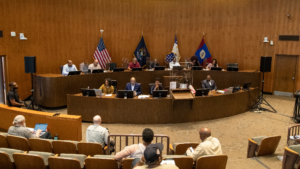An article in the Nature Climate Change journal argues that non-violent direct action taken by experts is effective
15:00 UTC Monday, 29 August 2022
Scientists should commit acts of civil disobedience to show the public how seriously they regard the threat posed by the climate crisis, a group of leading scientists has argued.
“Civil disobedience by scientists has the potential to cut through the myriad complexities and confusion surrounding the climate crisis,” the researchers wrote in an article, published in the scientific journal Nature Climate Change on Monday.
“When those with expertise and knowledge are willing to convey their concerns in a more uncompromising manner … this affords them particular effectiveness as a communicative act. This is the insight of Greta Thunberg when she calls on us to ‘act as you would in a crisis’.”
In recent months, scientists have shown themselves increasingly willing to take part in direct actions to bring attention to the climate crisis. A “scientists rebellion” mobilised more than 1,000 scientists in 25 countries in April, while in the UK a number of scientists were arrested for gluing scientific papers – and their hands – on to the glass facade of the Department for Business, Energy and Industrial Strategy.
The article was jointly written by five climate scientists: Stuart Capstick, Aaron Thierry, Emily Cox, Steve Westlake and Julia K. Steinberger. A sixth byline was taken by Oscar Berglund, a political scientist at the University of Bristol who studies civil disobedience and social movements.
A note appended to the article disclosed that all the authors “have participated in, and offered support to, groups carrying out civil disobedience to press for climate action”.
Berglund said: “What we say in the article is that getting involved in this kind of thing can actually add weight to the message that this is a crisis; that these are decent people who know more than anybody else about how deep in the shit we are, and are taking this kind of action – non-violent direct action, civil disobedience.
“We have a kind of what we call epistemic authority here: people listen to what we are saying, as scientists, and it becomes a way of showing how serious the situation is, that we see ourselves forced to go to these lengths.”
The article conceded that by taking political action, scientists will invite the criticism that they have abandoned their impartiality. However, it added that readers must ask themselves whether science’s “traditional modes of research and communication” are provoking a response from decision-makers that meets the enormity of the crisis.
It said: “The widespread notion that sober presentation of evidence by an ‘honest broker’ to those with power will accomplish the best interests of populations is itself not a neutral perspective on the world; it is instead conveniently unthreatening to the status quo and often rather naive.
“In addition to documenting the climate crisis in ever greater detail, we are obliged to consider how we might act in new ways to help bring about a necessary and urgent transformation.
“In the meantime, we have long since arrived at the point at which civil disobedience by scientists has become justified.”




